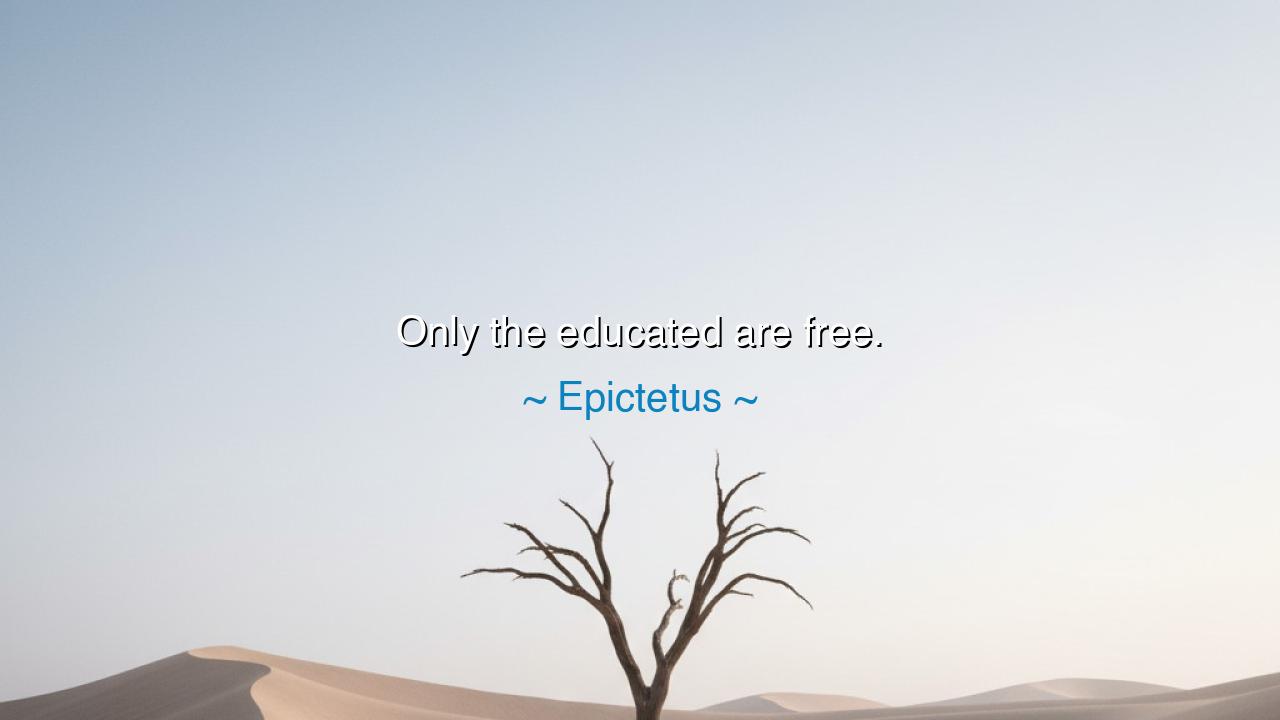
Only the educated are free.






In the immortal words of Epictetus, the Stoic philosopher who was once a slave and yet became a teacher of kings, we are given this blazing truth: “Only the educated are free.” These words cut to the marrow of human existence. For freedom, he tells us, is not the loosening of chains upon the body, but the liberation of the mind. The uneducated man, ruled by ignorance and passion, is a prisoner even if no bars surround him. But the educated man, who has trained his reason and disciplined his soul, walks free even in the darkest dungeon.
The origin of this saying lies in Epictetus’s own life. Born into slavery in the Roman Empire, he tasted the harshest bondage. Yet it was in the study of philosophy that he found true liberty. No master could chain his thoughts, no whip could silence his inner reasoning. By educating himself, by learning the ways of virtue, logic, and self-mastery, Epictetus rose above his condition. His body may have belonged to another, but his mind belonged only to himself. Thus he taught his students that true freedom is not granted by law or sword, but by knowledge and wisdom.
History bears witness to this truth. Consider Frederick Douglass, born into slavery centuries later. Forbidden to read, he hungered for letters, knowing instinctively that education was the path to freedom. He taught himself from scraps of books, whispering lessons to himself in secret. When he finally escaped to liberty, he declared that “knowledge makes a man unfit to be a slave.” His story is the living echo of Epictetus’s words: only the educated are free. Without knowledge, one remains bound by others’ control; with knowledge, one seizes the power to direct one’s own destiny.
The ancients, too, understood that ignorance is a prison. Plato’s allegory of the cave tells of men chained in darkness, mistaking shadows for truth. Only the one who rises to knowledge, who educates himself by turning toward the light, can walk free into reality. The others remain captives, though no physical chains bind them. So too Epictetus warns us: ignorance shackles us to falsehood, to manipulation, to fear. Education alone breaks the bonds and sets the soul in motion toward the light.
The meaning of this quote, then, is profound. To be educated is not merely to hold certificates or recite facts—it is to discipline the mind, to sharpen judgment, to distinguish truth from lies. A man who has not trained his thoughts is ruled by impulse, fashion, and deception; he is tossed like a leaf upon the wind. But the educated man, grounded in wisdom, cannot be easily enslaved. He may lose wealth, rank, or even liberty of body, but he remains free in spirit because he understands himself and the world.
The lesson for us is eternal: seek education not as a luxury, but as the very foundation of freedom. This education is not confined to classrooms—it is the lifelong pursuit of truth, through books, mentors, reflection, and experience. Guard your mind as you would guard your body, for without knowledge you will fall prey to those who would enslave you with lies. True education is the shield of the soul and the key to liberty.
Practical counsel is this: dedicate time each day to the cultivation of your mind. Read widely, not only for amusement but for wisdom. Question what you hear, test it against reason, and seek to understand before you judge. Learn from history, from philosophy, from science, from the lives of the great. Let your education not end with youth, for freedom is sustained only by continual learning. And remember always that in neglecting to learn, you consent to chains unseen.
Thus, Epictetus’s words stand as a flame across the centuries: “Only the educated are free.” They remind us that empires may rise and fall, rulers may grant or revoke liberties, but the freedom of the mind belongs to those who claim it. Children of tomorrow, take up this charge—educate yourselves, free your spirits, and you shall walk unbound, no matter the world around you.






AAdministratorAdministrator
Welcome, honored guests. Please leave a comment, we will respond soon